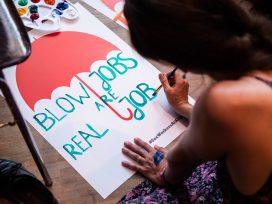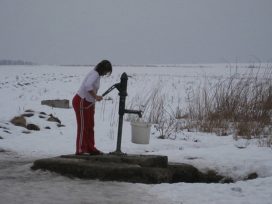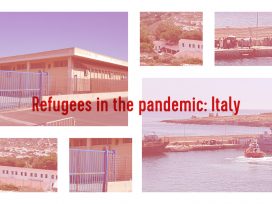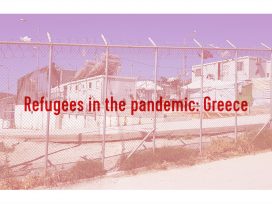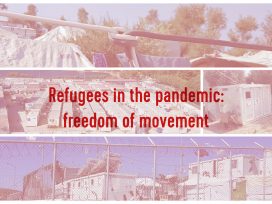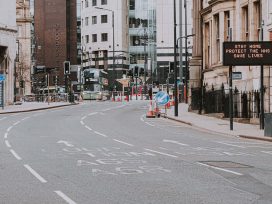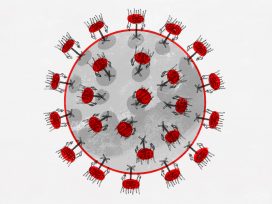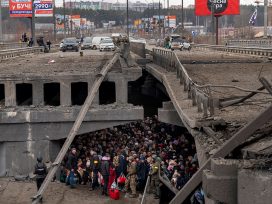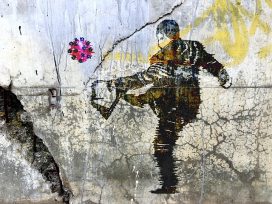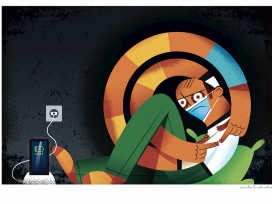Lessons from an unfolding emergency
The pandemic prompts fundamental questions. How do we define society’s relationship to nature? How resilient are our democracies to the abuse of emergency powers? How far can science dictate political decision-making? And will the primacy of the economy remain unassailable?
If you are going to get infected with anything, pray it’s laughter, the very best vaccine against mass hysteria. This laughter is so much more than simply mocking the ineptitude of politicians. There is, within it, a human response to the roar of nature reminding us that we are part of it, not its sovereign masters.
Many believed that the voice of nature had fallen so silent that its mouthpiece was destined to be a Swedish schoolgirl who, they said, could hear its whisper much more clearly. All of a sudden, however, we realise not only the paradox that our civilisation’s maturity is making us more vulnerable, but also the enduring truth of humanity’s archaic experience: that we can never completely dominate and control our own environment and circumstances.
In traditional societies, hygiene and health care was in the hands of priests who, in their ritual ceremonies, would combine immanent practical acts with transcendent divine commandments. The Old Testament’s rules of purification imply, for example, that Aaron’s status as high priest meant that he also held the office of chief hygienist.
The social function of priests as those who fuse immanent life, in its finitude, with transcendent order may have lost its central political role in modern society, but it has never vanished completely. The elemental experience that everything that shapes us as a community also transcends us in our capabilities, is as true in today’s digitised and globalised society as it is in tribal communities.
In this sense, the coronavirus pandemic is nature informing us that it is not only something that surrounds us from without, but that it is also the place into which we are born, in which we die, and which we must respect. Nature does not roar like a lion but makes itself heard through organisms that are much more dangerous to us, because they creep into human communities only to take them apart with deadly force.
The first lesson we can take away from the current state of pandemic emergency is that society, if it is to survive, must communicate with what surrounds and transcends it as its environment. We cannot simply extend our sovereignty over natural resources and declare ourselves the supreme rulers of nature. This is the sort of absurd notion that should provoke our contagious laughter.
A virus of absolute power
Yet it is equally evident that our response can only come from within society, rather than in the form of ecological or religious fatalism. The more the coronavirus spreads and kills, the more it stokes questions about the essence of politics.
Modern politics begins with the birth of Leviathan, the fictional monster brought into the world by Thomas Hobbes. Leviathan’s voice, however, is not the roar of unfettered nature transported into the brutal world of politics, nor the seductive song of kindly human nature, as the Enlightenment would later dream. It is a realistic voice telling us that human society is dependent on political authority that is formed not because it is backed by some higher truth, but because it has the power and ability to assert and enforce obedience, if necessary by force.
Many have argued that the current state of emergency is tantamount to a state of war. In fact, it teaches us less about the thin line between life and death than about the capacity of politics to take, implement and enforce collectively binding decisions and rules. Nor is it true that, in a state of emergency, all power is unconditionally assumed by a dictator. On the contrary, to declare a state of emergency is to confirm that emergency powers have a clear constitutional framework that cannot be transgressed.
We can recognise how free and democratic a society is by how it deals with abnormal situations. Moreover, the ability to tackle such crises is guided by a society’s historical experience, cultural and political practices, and unwritten rules. While, in the United Kingdom, the government had a special law passed in parliament that laid down rules restricting and controlling its own power, in Hungary Viktor Orbán pushed through a law handing him unlimited emergency powers. And in Sweden, where eugenics has historically been more popular than elsewhere in Europe, the government embraced a risky epidemiological experiment that left schools, shops and even restaurants open.
Instead of an overarching state of emergency, we are seeing a global pandemic engendering many different states of emergency. Even then, however, political will cannot take absolute precedence over the rule of law. The principle of proportionality still applies to all steps taken by a government during a state of emergency, and the constitutionality and legality of those actions must be assessed retrospectively.
The second lesson, then, is that where democratic immunity is weakened, there is a risk of a virus much more virulent than COVID-19: the virus of absolute power. In exceptional situations, we expect to be strong-armed into obeying rules that will save our lives. But in democracies we protect the luxury of free elections. These guarantee political accountability no matter how exceptional and catastrophic the circumstances.
Scientific knowledge, public opinion
While a state of emergency may seem like a sovereign moment of politics, the current pandemic reveals, in reality, how much power lies in expert knowledge. Politicians today are dependent more than ever before on virology, epidemiology, mathematical modelling and artificial intelligence.
The political distinction between public opinion – the doxa that steers populists – and the expertise derived from scientific knowledge – the episteme that guides technocrats – becomes blurred in a state of emergency. The slightest political mistake can have incalculable and fatal consequences. The doxa is stuck in absolute uncertainty, expecting the episteme to show the way.
However, whereas scientific knowledge is never definitive, a political decision is irreversible. Modern history is crawling with instances of politically abused science and cases of bad science. That is why, in the last decade, we have seen attacks on expert knowledge from both the left and the right. The radical left was buzzing with the vision of the mobilisation of the masses and what Ernesto Laclau described as ‘populist reason’, while the far right cut to the chase and railed elite scorning of national common sense.
However, natural disaster requires that the hard episteme dictates decisions to the soft doxa. The public sphere is a theatre of permanent conflict between different regimes of the doxa that all claim permanent validity. The scientific sphere, on the other hand, is an expanse of clear, but necessarily temporary, solutions of the episteme.
The third lesson, therefore, lies in the paradox that the calm voice of scientists must resound with the pathos of political persuasion if it is to convince the public of the wisdom of its measures. But scientists’ voices, too, can be difficult to discern in a polyphony, when what society is looking for is absolute unity and submissiveness.
There can be no straightforward decision, from either a medical or economic point of view, on whether to opt for the most stringent quarantine, in the hope that it will stop the infection in its tracks, or to fix upon more moderate measures, in an attempt to mitigate the worst effects while keeping society running. In the end, it is up to the politicians, and they rely on the vagaries of public opinion.
The value of the economic system
In recent weeks, we have all asked ourselves the question of whether to save human lives even at the cost of becoming much poorer in the years to come, or whether to sacrifice tens of thousands of fellow citizens so as not to jeopardise the prosperity and wealth of society.
Most of us dismiss the calculation out of hand, believing that saving people’s lives always takes precedence. However, although we refuse to admit it, our lives and everything we do carry only relative value. In healthcare, the considerations that always come into play are not only whether the treatment is effective, but also whether society can afford it and what quality of life the patient would have. We have waiting lists for some treatments, while others are so costly that they are available only privately or for patients up to a certain age.
But it should not just be economists and technocrats who get to decide what we can afford. We should also listen to voices on the other side. For example that of the Spanish doctor who, exhausted from placing herself at risk every day in the fight against the epidemic, berated the nation, saying that if doctors and nurses are paid thousands while football stars rake in millions, it is Messi the people should be going to for a vaccine.
Similarly, we can query the value of an economic system that, in the past three decades, has deepened social inequalities, reduced people’s opportunities in life, and indebted first households and then, to prevent itself from collapsing, entire states by resolving its own crisis on their dime. What sort of economic system is this that values so poorly the work of nurses, teachers, carers and others without whom society would have collapsed long ago in today’s state of emergency?
The last lesson, then, is that even the value of economic profit is socially relative. That is why our present emergency is an opportunity to rectify global economic asymmetry and the colonisation of other social areas, from science and education through health and public services, all the way to the environment.
It is not a battle between capitalism and socialism, globalism and nationalism, or democracy and authoritarianism. It is a much more fundamental conflict in which the rationality of the economic system threatens to engulf all other social systems; in which, through money, it dictates to the law what justice is, to politics what power is, to art what beauty is, and to science what to explore.
When the financial crisis erupted just over a decade ago, political institutions proved so weak that they let the patient dictate the treatment, covering all the costs while saving on other patients. Today we are in a different situation. We are reassessing not only political, but also economic values. The next doxa of public opinion must consider the value of economic profit in the light of its relationship to other public goods.
Published 14 May 2020
Original in Czech
Translated by
Stuart Hoskins
First published by Salon 2 April 2020 (Czech version); IWM (longer English version); Eurozine (shorter English version)
© Jiří Přibáň / IWM / Eurozine
PDF/PRINTNewsletter
Subscribe to know what’s worth thinking about.
Related Articles
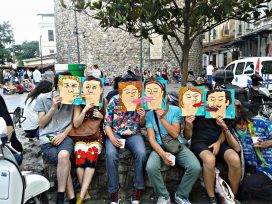
Losing ground and doubling down
Police violence on increase in Turkey
The covid crisis has hit Turkey hard and made its mark on the government’s approval ratings. The country already has the highest number of police officers per capita in Europe and the regime is clamping down on dissent with increasing force – be it Pride marches or women’s protests for the Istanbul Convention.

The less we care about healthcare workers
The importance of recognition in pandemic times
The commercialized celebration of minority groups distracts from real social and economic issues. Rainbow-washing can veil persistent homophobia, while ‘clapping for carers’ obscures the hardships health sector workers face.
